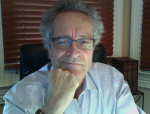Reaching Out
Reaching Out

Reaching Out
Joe Tarantolo, M.D., Psychiatrist
Reaching out to the other fringe groups in conflict with conventional medicine. (Yes, ISEPP is at the margins, not with the conventional.)
Wise Traditions is the quarterly journal of the Weston A. Price Foundation, an organization that is dedicated to restoring “nutrient dense” food to our 20th-21st century high fructose corn syrup processed food addicted diets. High fat, unpasteurized milk, grass fed beef, wild salmon, fermented vegetables, anti fluoridation, anti vaccination---you get the picture.
Sally Fallon, an old friend whose cook book is my frequent guide in the kitchen , called me recently to ask me to present a talk this fall at their conference in Dallas. Their yearly conference attracts over a thousand folk (has ISEPP ever had a thousand attendees?). I hadn’t spoken to Sally in several years but she remembered a comment I had made about the dangers of antidepressants, viz., they induce “not caring.” She asked me to present a talk. I accepted. The title of my talk: NOT BY BREAD ALONE DOTH MAN LIVE, EVEN IF IT’S SOURDOUGH: A CRITIQUE OF ANTIDEPRESSANTS AND THE MEDICAL MODEL IN PSYCHIATRY.”
My observations of those I see and read and with whom I interact in the alternative world, the herbalists, the naturopaths, the nutritionists is that they tend to make a mistake similar to the conventional model. But because they are not burdened by the prescription pad and the legal torments of forced treatments, they do less harm. But, they too make the mind/body split and tend to characterize “mental illness” as a “brain disease.” In fact “brain health” is a big seller in the alternative world. I am not dumping criticisms on brain herbs. I love them: Bacopa, Gingko, Rosemary, Kava, not to mention the plethora of herbs called adaptogens such as Reishi mushrooms and Ashwaganda (one of my favorites, a potent Indian herb very useful in the prevention and treatment of cancer). But what I will tell the Wise Traditions crowd is that no amount of the best high Vitamin A and E cod liver oil will cure a bad marriage. High dose vitamin therapy will not cure schizophrenia. Actually, the high dose vitamin crowd doesn’t do too badly with schizophrenia. If you read the Canadian guru, Dr. Carl Pfeiffer, who claims an 80% cure rate of schizophrenia, what you see is he takes the schizophrenic off of neuroleptics and gets rid of those who don’t cooperate, i.e., they are not included in his statistics. Yes, taking people off of neuroleptics will improve their chances of getting better. I suspect it has little to do with the vitamins.
A healthy body does not determine psychological health. The person dying with a terminal illness can be psychologically and spiritually healthy: facing mortality with courage, leaving behind old complaints and petty slights. I was thinking about “The Longest Day”; yesterday was the 75th anniversary of D-Day. I’m told that General Eisehower could not sleep the whole week before the Normandy invasion. I am sure he did not go to a psychiatrist and complain about insomnia. Ike was psychologically healthy, preoccupied about the thousands of boys he was sending on an uncertain task to certain death. He was healthy. Hitler took a sedative, he was sick!
Mental health is not about being happy. Evil sadists are often happy and they are mentally sick. Mother Teresa who cared for the dying struggled with despair. She was mentally/spiritually healthy. Mental health includes the ability to hold conflict, i.e., to suffer. The psychotic, the manic, the obsessed, the somatically preoccupied, the sadist, the pathologic narcissist, all take flight from suffering. Drugging and ECT aid in this escape caper. They do not promote mental and spiritual health. That’s the second time I used the term “spiritual.” What’s up with spiritual? The terminology about health is fungible. The pre-enlightenment idea of health was being at peace with God/Yahweh/Allah. We post-enlightenment religious types are not satisfied with that too easy of a position. The capacity to doubt and question and struggle with meaninglessness must be part of the picture. There is no easy path.

Great stuff Joe. As I have told you, I sometimes tell my patients: "If I could give you one gift, it would be the ability to feel bad, just to feel bad, without escaping into drugs, alcohol, sex, gambling, even exercise - just to feel bad and wonder about what is making you feel bad and what you might be able to do about it."